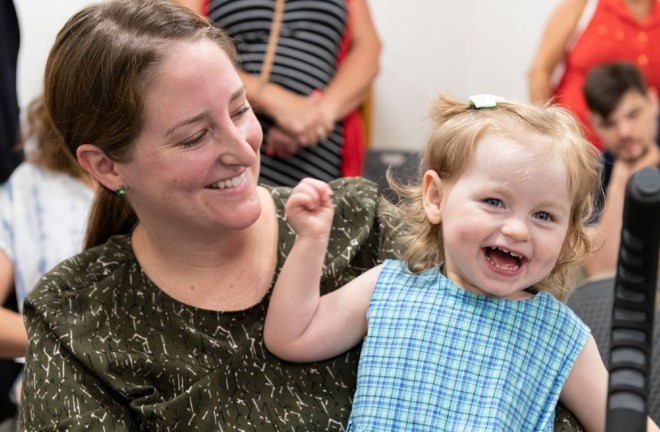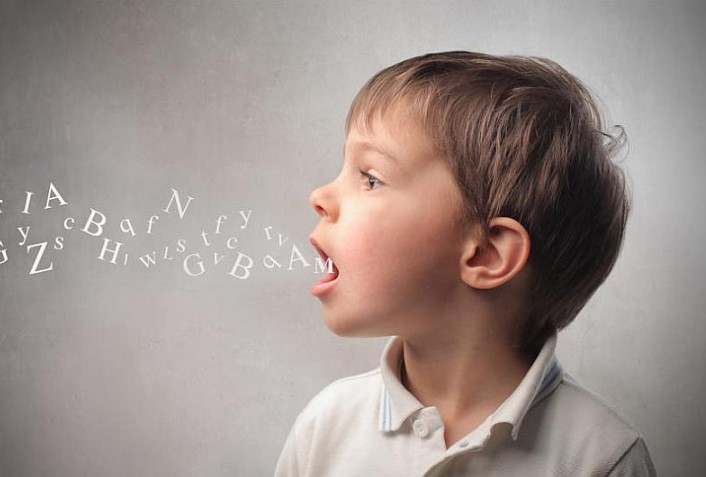Rejecting health concerns, government nixes quarantine for kids starting Thursday
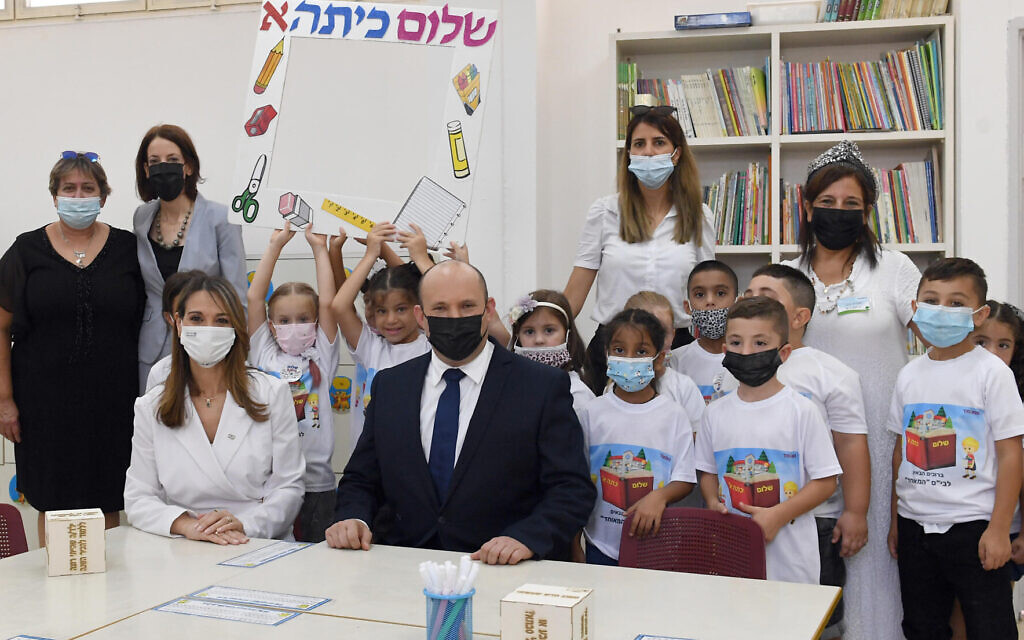
Israel is pushing ahead with a plan to exempt school children from needing to quarantine if they come into contact with a coronavirus carrier, the government announced Wednesday, despite concerns from health officials that the scheme could end up putting more kids in the hospital.
The plan, which will go into effect starting Thursday but was met by protests from teachers, comes after days of speculation that it could be delayed, with doctors and others raising concerns that allowing the disease to spread nearly unchecked in schools could put children in danger.
Health experts had initially supported the move to end precautionary isolation for children who come into contact with confirmed carriers when the plan was announced last week, but many reversed course amid reports of increased pediatric hospitalizations and instances of PIMS, a rare but dangerous condition affecting kids after they recover from the virus.
Prime Minister Naftali Bennett met with health officials on Wednesday to discuss the plan.
According to a statement sent out by the Health Ministry, the decision to go ahead with the plan was backed by Bennett, Health Minister Nitzan Horowitz and Education Minister Yifat Shasha-Biton.
Shasha-Biton had pushed to end quarantine requirements and keep schools open despite the explosion of cases in the last two weeks due to the Omicron variant, which has fueled record numbers of new cases daily.
Nearly 200,000 of Israel’s 540,000 currently active coronavirus cases are among school children. They also make up over 60 percent of Israelis currently in quarantine, according to figures published by the Health Ministry Wednesday morning.
“Canceling quarantine for healthy kids is our obligation toward the mental and physical health of children, and it will ease matters for parents affected by these quarantines,” Shasha-Biton said following the announcement Wednesday.
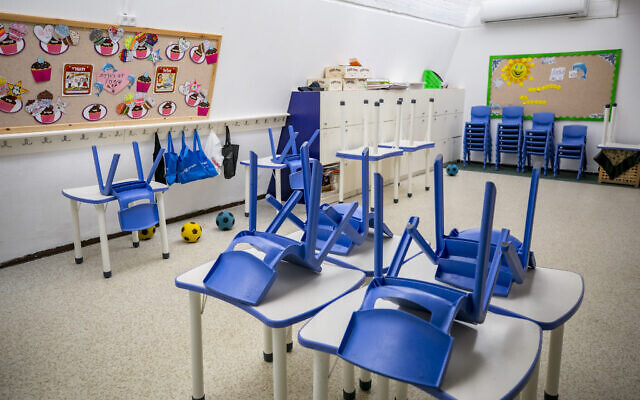
Illustration of an empty classroom at Cramim school in Beit Hakerem, Jerusalem on October 21, 2020. (Olivier Fitoussi/Flash90)
Immediately following the announcement, the Israel Teachers Union, one of the main labor organizations representing school staff, called on teachers to stay home Thursday in protest.
It derided the plan as “exposing [teachers] to the coronavirus in a way that endangers your health.”
Under the plan, all students both vaccinated and unvaccinated will need to take two home antigen tests a week, on Sundays and Wednesdays, and report negative results to an Education Ministry portal.
Children who test positive for COVID-19 at home will need to take an official antigen test at a state facility and isolate for five days if that too shows a positive result.
The announcement left unclear whether there would be any penalty for not testing among vaccinated students, stating only that those who are unvaccinated and refuse to take tests would be forced into quarantine when they come in contact with a confirmed carrier of the virus.
Those in close contact are encouraged, but not required, to test daily for five days.
On Thursday, the first day of the program, all students will be required to show a negative test.
The decision to go ahead came hours after the head of the Pediatricians Association said he was raising a “red flag” over the planned scrapping of isolation.
“Within four days, we will see the number of children in serious condition doubling. We are very apprehensive about the [quarantine] plan. It’s not too late to change it,” Dr. Zachi Grossman, who is also a member of the Israel Center for Disease Control, told the Kan public broadcaster Wednesday morning.
“We in the association are raising a red flag now and recommend not to cancel quarantine for children [starting] tomorrow,” he said.
Grossman’s statement marked a sharp reversal in his publicly stated opinion. On Tuesday he told the Haaretz daily that while there was an increase in hospitalizations and initial reports of pediatric inflammatory multisystem syndrome (PIMS), it was “not a massive amount that would justify stopping” the plan to cancel cautionary quarantine for children.
According to Health Ministry statistics, in the last month 21 children under the age of 9 have been hospitalized in serious condition with the coronavirus, and three children in the age group have died. Since the start of the pandemic 117 kids under age 9 have been hospitalized in serious condition and nine have died.
It was not immediately clear if PIMS cases were included in the tally.
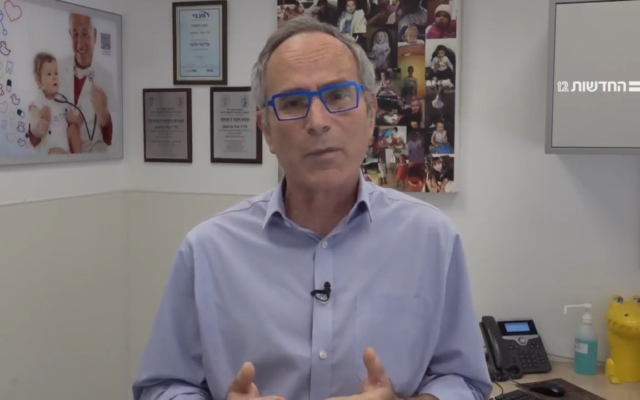
Head of the Pediatricians Association, Dr. Zachi Grossman speaks to Channel 12 news, December 30, 2021. (Video screenshot)
Several countries have seen a rise in PIMS cases during the Omicron wave, and health officials decided that if Israel saw a similar rise, quarantine could be reinstated for children even after the planned end on Thursday, Channel 12 news reported on Tuesday.
While most pediatric cases of coronavirus are mild, PIMS can cause hospitalization and death. The rare condition shows up 30-45 days after recovering from a COVID-19 infection.
PIMS is a new disease related to COVID-19. A study last year said the symptoms were “extremely complex,” including inflammation, fever and gastrointestinal and cardiovascular problems. The exact causes are unclear, but it appears to be related to overactivation of the immune system, causing the body to attack itself.
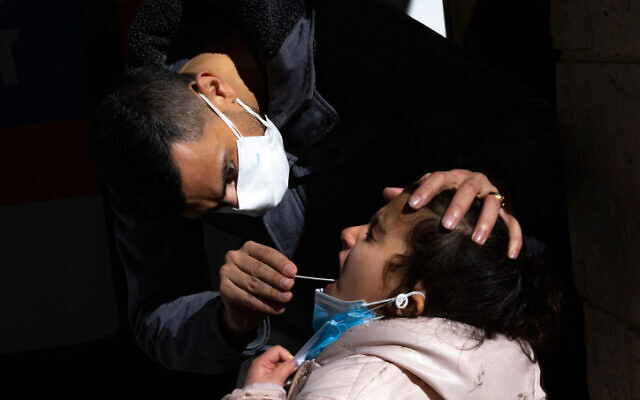
A father with the supervision of a Meuhedet Health care worker takes swab samples from a child at Meuhedet coronavirus testing center in Jerusalem, on January 18, 2022. (Olivier Fitoussi/Flash90)
The number of patients seriously ill with COVID-19 in Israel jumped Wednesday to 907, among 518,419 total active cases, according to Health Ministry figures. The death toll rose to 8,507
Ministry data showed more than 76,000 people tested positive for COVID-19 on Tuesday. Just over 21{b574a629d83ad7698d9c0ca2d3a10ad895e8e51aa97c347fc42e9508f0e4325d} of the nearly 400,000 tests came back positive — 23.44{b574a629d83ad7698d9c0ca2d3a10ad895e8e51aa97c347fc42e9508f0e4325d} of the PCR samples and 19.84{b574a629d83ad7698d9c0ca2d3a10ad895e8e51aa97c347fc42e9508f0e4325d} of the rapid antigen samples.

